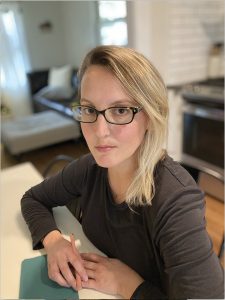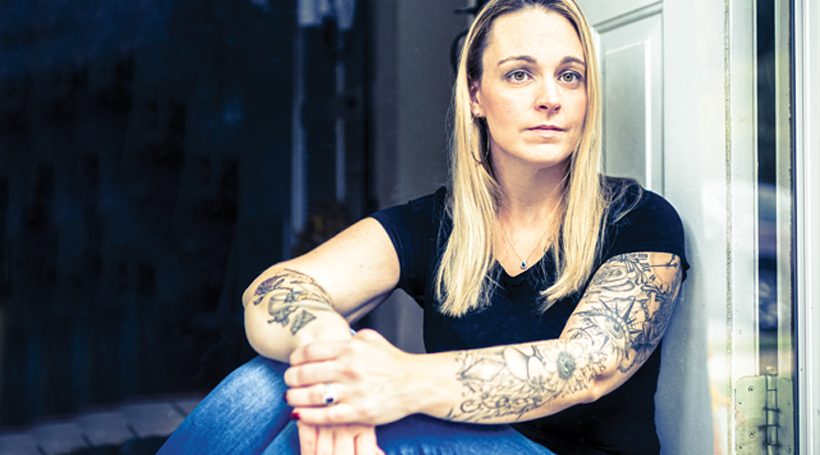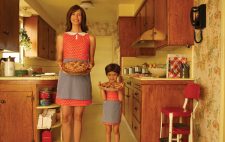Amanda Panarello Photo: David Michael Howarth
Quarantine is tough – for everyone. But there’s a difference between wishing you could go to a restaurant with friends and truly feeling like you’re the only person left on earth. The number of people who are experiencing complete despair during the pandemic is skyrocketing. So too is the number of adults who had conquered a mental health issue – anorexia, anxiety, addiction – only to relapse in lockdown. As we all focus on the deadly physical problems of Covid, the mental and emotional impact is being felt too. And for many, it is just as serious.
Amanda Panarello locked herself in her bedroom and texted her mom: “Get the kids out of the house.”
It was late March and Panarello, a nurse, had woken up with a fever and chills. “The week before, I had a guy come into the office and say, ‘I came in contact with someone who has Covid-19 and was told to quarantine – I need a note for my boss.’ He had no mask on, and was right in my face. At the time we were only being told to wear masks with symptomatic patients, so I wasn’t wearing one either.”
“She asked me to make her a Build- A-Bear with my voice in it in case I died.”
As soon as she felt the first symptoms, Panarello’s thoughts shifted to protecting her mom – who’s in treatment for a brain tumor – and her 8-year-old son, a severe asthmatic. Her children went to stay with their father, and over the next few weeks, Panarello was hospitalized, then house-bound, battling a case of coronavirus that was worsened by her heart condition. She was miserable and terrified, and worse, she was alone.
“I spiked a fever on a Thursday, and by Friday, I couldn’t stand up long enough to shower or walk into the bathroom. I went to the hospital, but because I had suspected Covid-19, they wouldn’t touch me,” says the 30-year-old Berlin resident.
After 2 days, Panarello was released from the hospital and went back to her home, where she was isolated in her bedroom. “It was honestly the worst feeling,” she says. “I wasn’t thinking about everybody else out there who was dealing with the same thing. I just felt like I was the only one. That’s what made me go crazier – wondering, ‘Is this normal? Am I ok?’ I’ve never been so scared in my entire life.”
She didn’t even have the energy to reassure her son or her 11-year-old daughter. “She asked me to make her a Build-A-Bear with my voice in it in case I died,” Panarello says. “I can’t even explain how helpless it made me feel. And not being able to see them made it all so much worse. I’d never been away from them more than 3 days, but they didn’t come home for a month. It was unbearable.”
As the pandemic wears on, loneliness is a secondary health crisis with serious consequences.
“Isolation is measured by how many people you interact with, but loneliness is a feeling,” says Rachel Pruchno, a psychologist at Rowan University School of Osteopathic Medicine who studies loneliness. “The feeling of being lonely is a huge predictor of morbidity.”
In other words, people who feel lonely are more likely to become very ill or die. “It’s a huge issue,” says Pruchno, “and we’re just starting to understand it.”
In pre-pandemic times, the elderly were the likeliest group to feel isolated. They are also the focus of Pruchno’s main research. The ongoing pandemic has been a unique opportunity to study how different generations of people are dealing with isolation and loneliness – and the PTSD and depression it may cause. Nowadays, Pruchno has found, loneliness is hitting a lot of younger people, even those who aren’t technically alone.

Laura Huffman
For Laura Huffman, the pandemic unleashed grief she hadn’t yet processed and it has brought on some old demons. A special education teacher assistant in Collingswood, she has 3 sons: a 5-year-old, a 2-year-old, and a little boy named Hunter who was stillborn in 2017. Huffman calls him her angel.
“The worst thing for an alcoholic is idle time.”
As the pandemic wore on, she found herself obsessing over her angel and the profound sadness of the loss. Under normal circumstances, she would have turned to her strong network of women – friends, family, her mom and sisters – to talk her down. But without the ability to be with them, she didn’t know where to turn for help.
“The days were so long,” Huffman says, noting that her husband, while supportive, works long hours outside of the home. “The news was constantly on, in your ear, driving you crazy, and I went into a state of panic. I had this feeling of impending doom all the time, and there was nothing I could do about it. I couldn’t stop thinking about what I had lost.”
Before long, she was in a deep spiral reminiscent of another time in her life. In her early 20s, Huffman was diagnosed with alcohol abuse disorder and was in and out of the hospital with seizures. Doctors said she wouldn’t have survived another month at the rate she was going.
Her friends and family as well as expert substance abuse treatment helped her break free and stay sober for 10 years. They were also there to help her through Hunter’s death. Being cut off from that so suddenly, when she needed them again, was jolting.
“The worst thing for an alcoholic is idle time,” she says. “In March, April, May and June, I had nothing but time. I didn’t want to drink, but the behaviors that came along with alcoholism came rushing back. I felt sad, guilty, empty.”
She didn’t know how to ask for help. In June, she broke down.
“I said I can’t do this anymore. I’m holding on by a thread,” Huffman says. “But I also said I cannot go backward. I refuse to go backward.”
Her 10 years in substance abuse treatment empowered her to recognize and handle her sadness, emptiness and grief when it came back in full force during the pandemic, she says. She now attends virtual recovery meetings once or twice a week and stays in touch with her support system through the phone, but it’s not the same, she says. It’s been more difficult for her to open up in a way that gets her the help she needs.
She’s not alone.
“Quite a few women in my recovery group have died since March,” Huffman says. “One of them was 10 years sober, like me. It just took one slip, and she died. We talk about the people who died of Covid, but we don’t talk about the amount of people who have died of alcohol and drug abuse or mental illness related to the pandemic. People just don’t know how to deal with it.”
“I want people to know that they never have to suffer in silence. Whether they have a day of sobriety or 20 years – it’s okay to reach out when you are struggling,” she adds.
For some, dealing with solitude for the first time has played havoc with health issues that were previously under control, such as anxiety. That’s what happened to Maggie Cohen, a Galloway native who moved into her own apartment in mid-February. Less than a month later she was stuck there alone with her cat, Charlie.

Maddie Cohen
“I’m immunocompromised, so I was just kind of locked away,” Cohen says. “I was trying to be chill, but I was so worried because my dad had just been in the hospital, and my mom has cancer. I was very nervous about her and about not being able to see her.”
Cohen kept her job, working from home as a customer care representative, but her hours were cut significantly. She filled the time with FaceTime calls to her family and friends, and tried to quell the anxiety by cleaning her apartment over and over.
“I probably FaceTimed my mom 8 times a day,” Cohen says. “She was so over it.”
“Sometimes I felt like I was going crazy,” she says, “and I didn’t have any other friends who were quarantining alone, so I’m not sure anyone really understood. I cleaned a lot to try to control the anxiety. I tried to manage it the best I could, but then outside my window things would just be really quiet and that was eerie. The silence would hit me and I’d realize all over again that we’re actually in a pandemic, that this is actually happening. When you’re alone, it’s easy to go down the rabbit hole and get overwhelmed by that fear.”
Cohen looked for distractions. “I didn’t know anything about plants – I killed them all – but my anxiety spiraled and I bought a few hundred dollars worth of plants, like 40 of them,” she says. “I grew some herbs and veggies on my balcony, and I worked on that a lot.”
Cohen continues to shelter-in-place at home, but she’s been trying to find creative outlets and new ways to connect with other people. She and some friends have started writing letters and sending packages to one another “old-fashioned-style,” and a few months back she was able to get a negative Covid-19 test. “It was amazing – I was able to hug my mom.”
Elyse Notarianni also contributed to this article.














